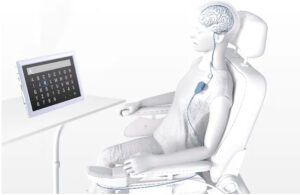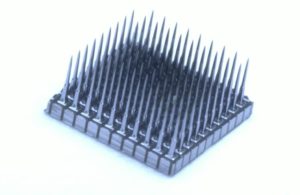
Blackrock Neurotech, BrainGate, ClearPoint Neuro, Neuralink, Synchron and more race to bring brain-computer interface (BCI) tech to market.
They’re using a multitude of methods — and developing their own systems that would allow patients to control a computer with their brain.
Such technology could potentially enable countless immobile people someday to control a mouse cursor, keyboard, mobile device/tablet, wheelchair or prosthetic device by only thinking.
The FDA last year issued leapfrog guidance for nonclinical testing and study design related to implanted brain-computer interface (BCI) devices. Leapfrog guidance allows the agency to share its initial thoughts on emerging technologies that are early in development but appear likely to be of importance to public health.
Companies have faced a number of challenges as they try to bring brain-computer interface technology to the market, but they continue to make progress.
Here is a handful of companies making waves with their BCI developments:
Neuralink
An Elon Musk venture, Neuralink is developing an implant placed in the brain through a robot-assisted procedure.

Musk has said in the past that the less invasive Link device (compared to other deep brain stimulation systems that are implanted around the chest area) is implanted through the skull. The entrepreneur claims it could be implanted in less than one hour in an outpatient setting and without the use of general anesthesia, with options for removal or upgrades down the line.
In a 2020 webcast, Musk described Link as a small device with a rechargeable battery meant to last a full day, with wires embedded in the cortical surface of the brain for continuously recording 1,024 channels of neural signals at once. It has a six-axis inertial measurement unit for tracking head movement, more sensors for measurables like temperature, and a Bluetooth antenna to connect with a smartphone app.
While Musk and company officials said they planned to file for FDA approval for human trials in 2020, it has yet to receive any such approval. Earlier this year, Neuralink and the University of California, Davis, were accused of “egregious violations of the Animal Welfare Act” by the Physicians Committee for Responsible Medicine (PCRM), citing documents obtained through a public records lawsuit. The allegations claimed that Neuralink caused extreme suffering in monkeys.
Multiple reports have claimed that Musk expressed frustration with the slow progress at Neuralink, but he has touted a “show and tell” that will demonstrate where the Link device is set for Oct. 31, 2022.
Synchron
Officials at Synchron — developer of the catheter-delivered Stentrode brain-computer interface (BCI) implant — believe they’re the only BCI company tapping into blood vessels to capture signals from the brain.

Last month, the company completed its brain-computer interface implant in the U.S. through the endovascular approach. The Stentrode device was implanted as part of Synchron’s Command trial, operating under FDA investigational device exemption to assess a permanently implanted brain-computer interface.
Command will assess the safety and efficacy of the company’s motor BCI technology in patients with severe paralysis, aiming to enable the patient to control digital devices hands-free. Study outcomes include the use of brain data to control digital devices and achieve improvements in functional independence.
Synchron’s rise to rival BCI developers reportedly caught the eye of Musk, who was said to have inquired to the company about a potential investment. No details were provided on whether or not the deal would involve a merger, acquisition, collaboration or any other type of coming together of the compa345anies.
Blackrock Neurotech
While some companies have made recent waves with their BCI advancements, testing of Blackrock’s technology has been ongoing in human patients for nearly 20 years. The Utah Array implant has been used in patients since 2004 through research studies, with zero FDA-reported serious adverse events since then.

In 2021, Blackrock Neurotech received FDA breakthrough device designation for its MoveAgain BCI system for providing immobile patients with the ability to control a range of devices by only thinking. The company said at the time of receiving the breakthrough nod that MoveAgain BCI could offer improved mobility and independence that leads to returning to work, participating in leisure activities and communicating more effectively and quickly.
MoveAgain BCI includes an array implanted in the brain, which then decodes movement from neuronal activity. Signals are then transmitted wirelessly to an external device, like a cursor or wheelchair, providing people control of their external environment.
Blackrock and the University of Pittsburgh’s Rehab Neural Engineering Labs (Pitt RNEL) have collaborated on the first portable brain-computer interface (BCI) to allow patients to participate in research trials from home. A Blackrock representative said it’s the final step as the company prepares to launch its first commercial product early next year.
Should the device be made commercially available, it would mark the first time humans are connected to computers outside of academic research studies.
ClearPoint Neuro
ClearPoint Neuro in July 2021 entered into an agreement with none other than Blackrock Neurotech to develop an automated surgical solution for implanting BCIs into patients with neurological disorders — including from paralysis, ALS, blindness and hearing loss.

Earlier this year, ClearPoint announced a collaboration with Durham, North Carolina–based Higgs Boson Health to bring to market a patient-facing digital application based on the ManageMySurgery platform. The application will specialize in drug delivery to the brain and spine, as well as BCI technology.
BrainGate
BrainGate’s neurotechnology uses an array of micro-electrodes implanted in the brain to let humans operate external devices such as computers or robotic arms with just their thought. The investigational BrainGate system has allowed people with spinal cord injury, brainstem stroke, and ALS to control a computer cursor simply by thinking about the movement of their own paralyzed hand and arm.

BrainGate said on its website that early clinical research demonstrated that the system had intuitive control over advanced prosthetic limbs. The company claimed the system provided people with paralysis with easy control over powerful assistive movement and communication devices.
Neurable
Neurable began as a developer of virtual reality (VR) applications, including a mind-controlled VR game that it unveiled in 2017.

“We want to be the company that makes neurotechnology easily accessible to everyone, everywhere,” the company’s website reads.
Neurable CEO Dr. Ramses Alcaide told Forbes that using VR demonstrated concepts and proved the early value of BCI technology, allowing the company to create the headphone form factor that it aims to bring to market. Through this, Neurable aims to make computer interfaces more intuitive and go beyond the potential limitations of keyboards, touch screens, and voice interfaces.
One more to watch: Snap’s NextMind technology
NextMind’s patented EEG electrodes detect brain activity in an effort to comfortably capture neural signals, allowing the user to perform real-time actions.

Such was the potential of Paris-based NextMind’s technology that earlier this year, it was acquired by Snap – the company behind the popular Snapchat social media app.
According to The Verge, NextMind’s roughly 20 employees will remain in France and work for Snap Lab with an eye on integrating the NextMind technology into future versions of the company’s Spectacle AR glasses. The report said NextMind’s headband developer kit would be discontinued.

